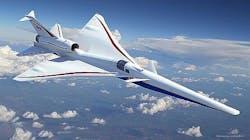Collins Aerospace to provide sensors, avionics, and touch-screen displays for NASA's supersonic X-59
The Military & Aerospace Electronics take:
22 Jan. 2019 -- The X-59 is being developed by Lockheed Martin for NASA to collect data that could make supersonic commercial travel over land possible through low sonic boom technology. United Technologies acquired Rockwell Collins last fall and changed its name to Collins Aerospace.
Collins will provide developmental engineering support to tailor its Pro Line Fusion avionics to the X-59. Collins also will provide touchscreen primary flight displays with tailored multi-function windows, head-up display (HUD) symbology, synthetic vision, ARC-210 communication radios, and a suite of navigation and surveillance equipment. In addition, Collins will provide a dual multi-spectral enhanced vision system (EVS-3600).
To achieve supersonic speeds with a low sonic boom signature, the X-59 must have a long and slender shape. This shape also makes a forward-looking window impractical. The EVS-3600 will enable pilots to land in nearly all conditions using advanced visual sensors leveraging long wave infrared technology.
Related: Navy asks Rockwell Collins to provide AN/ARC-210 avionics radios in $288.5 million order
John Keller, chief editor
Military & Aerospace Electronics
Ready to make a purchase? Search the Military & Aerospace Electronics Buyer's Guide for companies, new products, press releases, and videos

